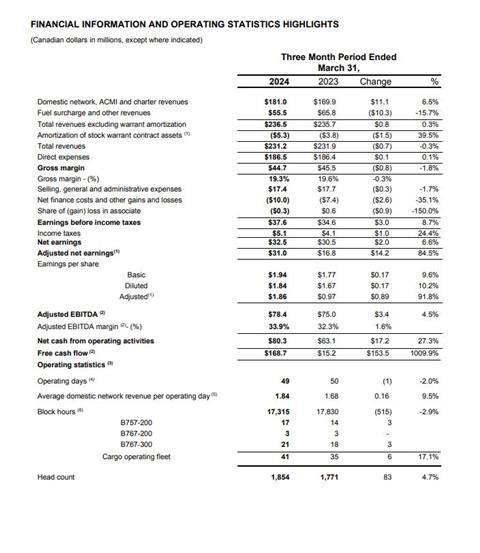Canada-headquartered Cargojet saw its profits improve in the first quarter as the business benefitted from rising domestic e-commerce demand.
The company saw first-quarter revenues slip 0.3% year on year to C$231.2m, while earnings before income taxes (ebit) improved by 8.7% to C$37.6m and net earnings were up 6.6% to C$32.5m.
The decline in revenues was largely the result of lower fuel surcharges and 'other revenues', which were down 15.7% to C$55.5m.
Looking at revenues generated by the company's domestic, ACMI and charter business, there was an increase of 6.5% to C$181m.
Revenues on the domestic network increased by 7.1% year on year fuelled by e-commerce.
"The increase was due primarily to an increase in e-commerce and B2B volumes during the period, and contractual customers’ consumer price index increases," the company explained.
Revenues for its ACMI business were up 8.2% as a result of the deployment of additional aircraft on a short-term basis, as well as an increase in ad hoc ACMI flights.
All-in charter revenues for the period were down 1.5% as a result of a decrease in ad hoc charters and scheduled flights.
The company pointed out that overall block hours were down 2.9% on last year but that the aircraft carried higher revenue-generating volumes.
Overall, the cargo business said it was "encouraged with the positive start of the 2024 fiscal year".
"The hesitancy in consumer spending that was experienced in the first quarter of 2023 for time-sensitive cargo that is relevant for the markets served by Cargojet has improved
somewhat.
"Management remains cautious given the increasing geo-political uncertainty and potential supply chain disruptions."
Jamie Porteous, co-chief executive, said: “We further optimised our fleet and flight schedules; combined with an encouraging increase in volumes, we are starting to see the margin improvements we have been working on since 2023.
"Our cautious optimism is tempered by the increasing geo-political uncertainty and potential supply chain disruptions. We are particularly pleased to start the year with strong cashflow generation that will help us execute the strategic priorities we laid out earlier this year.”
At the start of the year, the carrier announced it would exit plans to operate Boeing 777 freighters in a bid to safeguard its business against continuing soft air cargo demand.
The freighter operator has decided it will no longer convert four Boeing 777-200s into freighters, leaving it with no current 777F options.
This decision, announced in a January 15 fleet update, is a step away from its original plans to convert eight 777s (four -200s and four -300s).
Cargojet will instead focus on its Boeing 767F aircraft, but has retained the rights for future 777 conversions.
The firm's fleet currently stands at 41 aircraft - 21 767-300Fs, 3 767-200s and 17 757-200s.
















